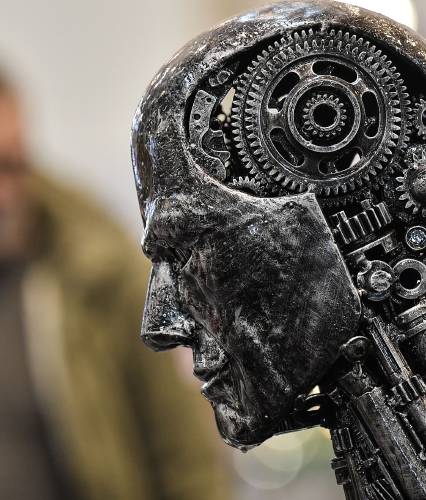My Turn: More tech isn’t better for school

In this Nov. 29, 2019, file photo, a metal head made of motor parts symbolizes artificial intelligence, or AI, at the Essen Motor Show for tuning and motorsports in Essen, Germany. AP FILE PHOTO/MARTIN MEISSNER
| Published: 02-08-2024 9:29 PM |
The recommendations to the commonwealth for education reform from the Rennie Center for Education Research and Policy [“Report highlights flexibility, tech in ed,” Recorder, Feb. 5] were initially quite interesting. Encouraging flexibility in scheduling, highlighting ways in which responsibilities can be shared, and suggesting ways to vary the students’ workday all have significant positive possibilities.
What utterly deflated me was the latter portion of the article, where it became clear that these recommendations were largely expected to be carried out online or through shared computer programs. Hence, the center’s admission that their strategies would “need to go hand-in-hand with investments in making computers and the internet more accessible.”
During my career as an educator, it became a dreary mantra of those surrounding the education world that bringing tech into our classrooms was an absolute necessity, one bound to result in wonders, and subtly, also indicate whether we were good teachers.
So under the pressure of missing out on an urgently promised good thing, school districts across America poured untold billions of dollars into investments in technology, on hardware, software, licensing, internet access, teacher training, and, of course, tech staff to try to maintain some semblance of functionality. And yet, in the 10 years leading up to the COVID shutdowns, schools across Massachusetts and the nation saw a steady decline in comprehensive test scores.
Did the growing reliance on technology in the classroom have any role in the nationwide decline in educational effectiveness? It is a question that should be examined, and very thoroughly, because the downward trend became a full collapse during the shutdowns when education went fully online.
Whatever the connection may or may not be, it is clear that technology, despite budget-busting expenditures, has been wholly ineffective over many years in fostering any improvements in educational outcomes.
But now the Rennie Center holds out once again the frail promise that sticking kids online to do “distance learning” is, somehow, against significant evidence to the contrary, going to improve educational outcomes.
I’m wondering though if cracks haven’t begun to appear in the Great Wall of Technological Fundamentalism. Two quotes from the article leapt out. In the first, a surprisingly threatening statement, one of the center’s representatives is quoted saying, “There is no stopping the infiltration of artificial intelligence, or AI, into the schools.”
Article continues after...
Yesterday's Most Read Articles
 PHOTOS: Making progress at Bridge of Flowers
PHOTOS: Making progress at Bridge of Flowers
 HS Roundup: Pioneer baseball takes down back-to-back Div. 3 champion Oakmont, 7-3
HS Roundup: Pioneer baseball takes down back-to-back Div. 3 champion Oakmont, 7-3
 Dog shelter clears first hurdle with Deerfield Planning Board approval
Dog shelter clears first hurdle with Deerfield Planning Board approval
 ‘A real joy to work with’: Orange letter carrier retires after 31 years
‘A real joy to work with’: Orange letter carrier retires after 31 years
 Montague Police Logs: April 22 to April 27, 2025
Montague Police Logs: April 22 to April 27, 2025
 Baseball: Greenfield's Conner Bergeron allows just one hit as Wave take down Turners Falls, 11-1, in five innings
Baseball: Greenfield's Conner Bergeron allows just one hit as Wave take down Turners Falls, 11-1, in five innings
The speaker’s choice of the word “infiltration” is certainly sinister. Is this inevitability seen as a hostile takeover? Does the darkness of that statement also have a hint of despair? We all have only vague ideas of what applications AI may have in the classroom and significant hints of the technical, academic, moral and personal problems that are likely to arise, but there are those who will willingly hustle AI into your child’s classrooms just as quickly as they can actually facilitate the “infiltration” because so few lack the courage to say “no.”
Not yet — not until we know how and why, and whether it will be of any significant benefit.
A second quote admits that “kids … more likely in middle or high school than elementary school, can function on Zoom.” “More likely” they can “function?” Seems the speaker’s expectations of technology are so bleak, he had to offer them that low a hurdle — spend your hundreds of thousands, your collective multimillions, and it’s “likely” some will “function.”
To date, there are clear indications that investments in technology have had no positive effect on educational outcomes. Recommendations made in spite of this fact have traction only because most of the world is intimidated by technology and swayed by the bland and, in the case of AI, wholly uninformed assurances of its fundamentalist backers.
It’s time for outsiders to stop foisting forever shifting technology on our schools, promising miracles, all the while expecting teachers to make good on their own wishful thinking.
Stephen Hussey lives in Greenfield.






 My Turn: The Palestinian Arab encounter with Zionism
My Turn: The Palestinian Arab encounter with Zionism Michael D. Joyce: Pray for grace
Michael D. Joyce: Pray for grace Rory Fern Catao: Save our oceans!
Rory Fern Catao: Save our oceans! David Kempf: The NFL and Dems
David Kempf: The NFL and Dems
